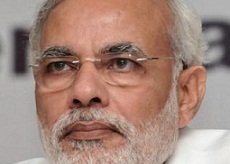 A strong
7.4-magnitude earthquake hit southern Mexico, damaging some 800 homes
near the epicentre and swaying tall buildings and spreading fear and
panic hundreds of miles away in the capital of Mexico City.
A strong
7.4-magnitude earthquake hit southern Mexico, damaging some 800 homes
near the epicentre and swaying tall buildings and spreading fear and
panic hundreds of miles away in the capital of Mexico City.
 One
of the strongest to shake Mexico since the deadly 1985 temblor that
killed thousands in Mexico City, earthquake hit hardest in border area
of southern Oaxaca and Guerrero states.
One
of the strongest to shake Mexico since the deadly 1985 temblor that
killed thousands in Mexico City, earthquake hit hardest in border area
of southern Oaxaca and Guerrero states.
In Guerrero, officials confirmed that some 800 homes had been damaged, with another 60 having collapsed.
Hours
after the shaking at noon local time (2332 HRST IST last night), there
were still no reports of death or serious injury, even after a less
powerful, magnitude-5.1 aftershock was felt in the capital and several
other aftershocks near the epicentre in a mountainous rural region.
"It
was very strong, very substantial," said Campos Benitez, hospital
director in Ometepec, about 25 kilometres from the epicentre.
Guerrero
Gov. Angel Aguirre, who is from Ometepec, was headed there to survey
the damage and ordered emergency crews and civil protection to the area
to help with the damage. The state did not say how many were displaced.
In Mexico City, frightened workers and residents poured into the streets of the capital.
Telephone
service was down in the city and throughout the area where the quake
was felt and some neighborhoods were without power, according to Mexico
City Mayor Marcelo Ebrard, who set up a hotline for people to report
damage.
A
pedestrian bridge collapsed on an empty transit bus. About 40
passengers were stranded for a short time on the Mexico City airport air
train, but later released. The airport closed for a time but officials
said there was no runway damage and they resumed operations.
Samantha
Rodriguez, a 37-year old environmental consultant, was evacuated from
the 11th floor on the Angel Tower office building.
"I thought it was going to pass rapidly but the walls began to thunder and we decided to get out," she said.
Mexico City, built on a lake bed, was badly damaged in 1985 when an 8.1 earthquake killed at least 10,000 people.
In
past years, Guerrero has suffered several severe earthquakes, including
a 7.9 in 1957 which killed an estimated 68 people, and a 7.4 in 1995
which left three dead.
Quake
was the strongest shaking felt in the capital since a magnitude-6.5
earthquake struck also in Guerrero in December. Officials said at least
three people died in Guerrero, but there were no reports of widespread
damage.
A
magnitude-8.0 quake near Manzanillo on Mexico's central Pacific coast
killed 51 people in 1995 and a magnitude-7.5 quake killed at least 20
people in the southern state of Oaxaca in 1999.
In
Huajuapan, Guerrero, near the epicentre, hotel manager Marco Antonio
Estrada also reported shaken-up guests but no major damage. He said it
was longest and strongest he ever felt. People ran out of their homes
and cars.
"It
was very strong, but we didn't see anything fall," said Irma Ortiz, who
runs a guesthouse in Oaxaca. She said their telephones are down, and
that the quake shook them side-to-side.
US President Barack Obama's oldest daughter, Malia, was reported to be safe while on vacation with a school group in Oaxaca.
The
US Geological Survey set the preliminary magnitude of the first quake
at 7.4 and said the epicentre was 11 miles underground. The survey set
the aftershock at 5.1. Seismologists and civil protection officials said
there didn't appear to be heavy damage or casualties because of where
and how the earthquake hit.
There
were reports of damaged buildings but none collapsed on the Oaxaca side
of the border, said civil protection spokeswoman Cynthia Tovar said.
Authorities believed that the absence of tall buildings in the area is
one reason.
Another
factor may be the high frequency of earthquakes in the region, said
USGS seismologist Susan Hoover. There have been 15 earthquakes of
magnitude 7 or stronger since 1973 within 500 kilometres of Tuesday's
quake. Weaker buildings collapse with each quake, leaving a cadre of
stronger ones that can withstand the shaking.
"Another factor to consider is how tested an area has been," Hoover said.
 India and South Africa meet in a
one-off Twenty20 international at the Wanderers Stadium on Friday, with
India coach Duncan Fletcher insisting the long, round trip will be
worthwhile.
India and South Africa meet in a
one-off Twenty20 international at the Wanderers Stadium on Friday, with
India coach Duncan Fletcher insisting the long, round trip will be
worthwhile.






























